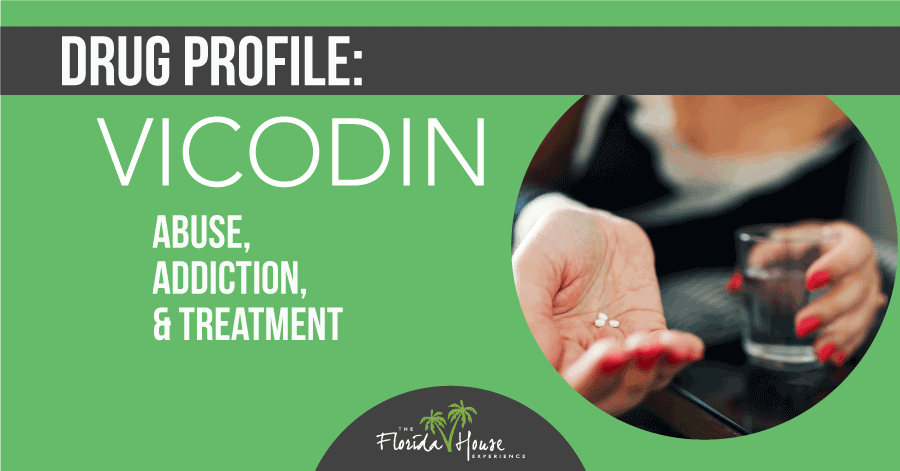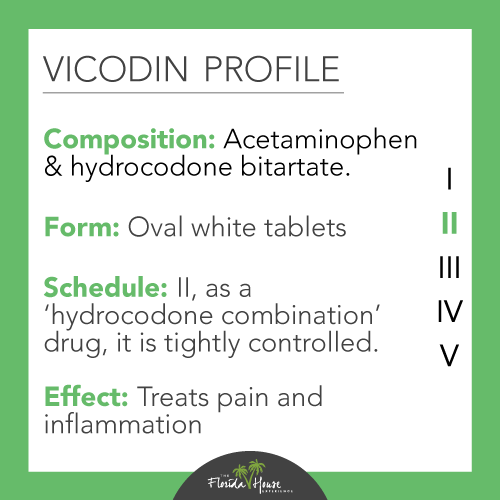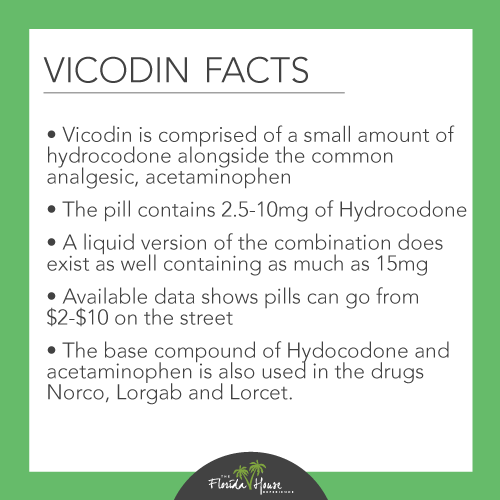
What Is Vicodin?
Hydrocodone-acetaminophen (generic for Vicodin, Lortab, Norco) is a narcotic analgesic used to treat pain and inflammation. It was first introduced to the United States market in 1978, and since that time, it has become one of the most widely used and abused opioid-based medications in the country.
Each standard Vicodin pill contains 300 mg of acetaminophen (commonly known as Tylenol) and 5 mg of hydromorphone, which is the equivalent of 5 morphine milligram equivalents, or MMEs. Vicodin is also available in tablets containing 7.5 mg or 10 mg of hydrocodone each.
In the generic form, Vicodin tablets contain either 300 mg or 325 mg of acetaminophen combined with 2.5 mg, 5 mg, 7.5 mg or 10 mg of hydrocodone. There is also a liquid generic of Vicodin formulated with 325 mg of acetaminophen and either 7.5 mg or 10 mg of hydrocodone per 15 ml dose.
Because Vicodin contains the opioid hydrocodone, which is a synthetic form of morphine, it works by suppressing the pain receptors in the brain while also suppressing activity in the central nervous system.
Why Is Vicodin Prescribed?
 Vicodin is commonly prescribed to treat moderate to severe pain following surgery or an acute injury. According to the Journal of the American Dental Association (JADA), Vicodin “is the most frequently recommended opioid pain reliever prescribed by US oral surgeons after the extraction of third molars.”
Vicodin is commonly prescribed to treat moderate to severe pain following surgery or an acute injury. According to the Journal of the American Dental Association (JADA), Vicodin “is the most frequently recommended opioid pain reliever prescribed by US oral surgeons after the extraction of third molars.”
Doctors may also prescribe Vicodin for patients who are suffering from cancer-related pain, including nerve pain. Other approved uses for Vicodin include the treatment of diabetic neuropathy and phantom pain caused by the amputation of a limb.
Because Vicodin suppresses the central nervous system, it is not safe for use in children aged 18 or younger. It also cannot be combined with any other medications or substances that may depress the respiratory system, including alcohol and other opioids.
How Is Vicodin Classified?
Vicodin is what’s known as a hydrocodone combination product, or HCP. Other common HCPs that also contain acetaminophen and hydrocodone are Lortab, Norco and Procet. HCPs such as Alor, Panasal and Damason-P combine hydrocodone with aspirin, while both Kewlcof and Entuss contain the expectorant drug guaifenesin with hydrocodone.
As of October 6, 2014, all HCP drugs were re-classified by the U.S. Drug Enforcement Administration (DEA) from Schedule III to the more restrictive Schedule II under the Controlled Substances Act (CSA) because HCPs have a high potential for abuse. This reclassification placed strict limits on the amount of Vicodin doctors could prescribe at once to a maximum of 90 days (down from 180 days), and pharmacies can only dispense a maximum of a 30-day supply of Vicodin at one time.
According to a report by an unnamed urban county health care system in Texas, the rescheduling of HCPs resulted in a dramatic decline in the number of hydrocodone-acetaminophen prescriptions in that area. Researchers found that the number of HCP prescriptions fell by over 80 percent in the first 180 days after October 6, 2014, while orders for acetaminophen-codeine products such as Tylenol #3 jumped by over 200 percent.
How Common Is Vicodin Abuse?
 The combination of the opioid hydrocodone and the painkiller acetaminophen often gives Vicodin users a noticeable feeling of relaxation and euphoria, making Vicodin and other HCPs highly susceptible to abuse and addiction.
The combination of the opioid hydrocodone and the painkiller acetaminophen often gives Vicodin users a noticeable feeling of relaxation and euphoria, making Vicodin and other HCPs highly susceptible to abuse and addiction.
Although there are no specific published statistics that report the prevalence of Vicodin abuse in America, a recent study by BlueCross/Blue Shield reveals that there has been an estimated 493 percent increase in the number of cases of diagnosed opioid use disorder (OUD) from 2010 to 2016. The same study also reveals that “patients who fill high-dosage opioid prescriptions have much higher rates of opioid use disorder than patients who fill low-dose prescriptions” regardless of the duration of the treatment and that women aged 45 and over have higher rates of OUD than men.
According to the Centers for Disease Control and Prevention, an estimated 46 people in the United States die every day from an overdose of prescription opioids. As of 2017, prescription opioids “were involved in more than 35 percent of all opioid overdose deaths,” and Vicodin was among the three most commonly implicated prescription opioids in these overdose deaths.
Prescription rates for drugs such as Vicodin have fallen since 2012; however, the amount of morphine milligram equivalents prescribed per person remains approximately three times higher than it was in 1999.
Despite DEA restrictions on HCPs, Americans continue to use a tremendous number of prescription opioids like Vicodin every year. American opioid prescriptions account for approximately 30 percent of opioid prescriptions worldwide.
Signs of Vicodin Overdose
 Like all opioid overdoses, a Vicodin overdose can cause immediate, life-threatening symptoms, including extreme drowsiness, low blood pressure and seizures. If left untreated, a person who has overdosed on Vicodin or any other HCP may experience slow, labored breathing, slip into a coma and die.
Like all opioid overdoses, a Vicodin overdose can cause immediate, life-threatening symptoms, including extreme drowsiness, low blood pressure and seizures. If left untreated, a person who has overdosed on Vicodin or any other HCP may experience slow, labored breathing, slip into a coma and die.
HCPs that contain acetaminophen are also known to be a “common cause of acetaminophen acute liver injury.” This is a life-threatening condition that can develop rapidly following either the ingestion of a single, large dose of acetaminophen or from taking excessive amounts of acetaminophen over a number of days.
Because of the significant risk of experiencing an overdose while taking an HCP, some pharmacists and doctors are now recommending that all HCP users be provided with a naloxone kit to block the effects of the hydrocodone if an overdose occurs.
Are You Worried About Your Vicodin Use? Call Us
If you’re worried about the amount of Vicodin you’re using, or you think you may have become dependent on Vicodin, don’t try to tackle the problem alone. Call us here at FHE Health to learn how we can help you safely detox off Vicodin and learn how to deal with your Vicodin addiction in a safe, medically supported environment.






